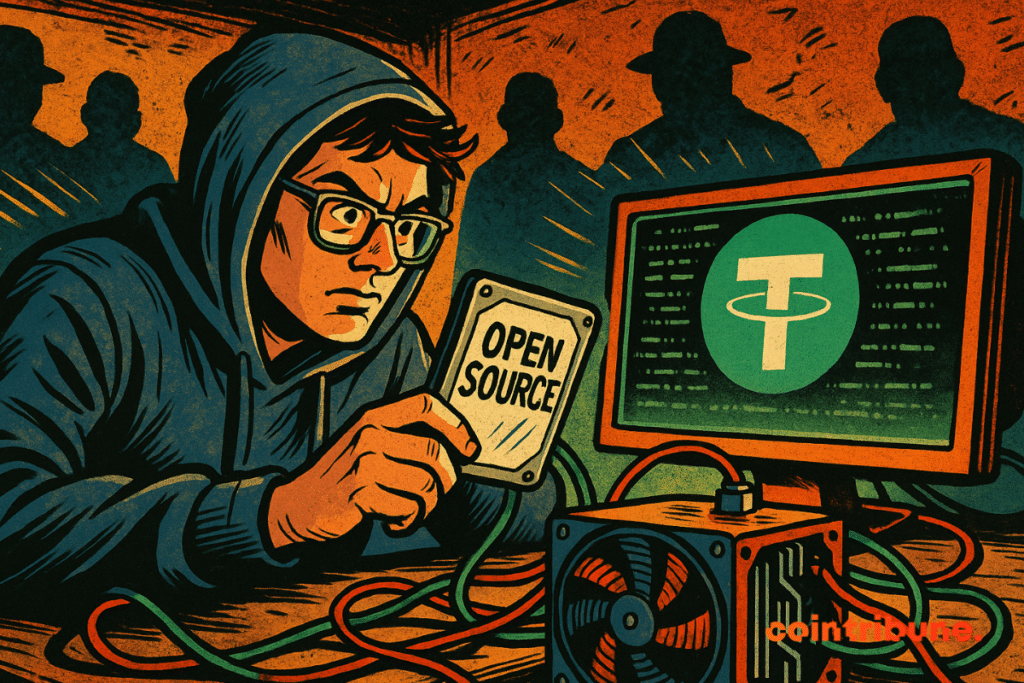Tether to Open-Source Bitcoin Mining Software, Leveling the Playing Field
Tether, the company behind USDT, plans to open-source its Bitcoin Mining OS (MOS) by Q4 2025, making it easier for smaller miners and businesses to run their own operations without third-party services.

In Brief
- Tether will open-source its Bitcoin Mining OS (MOS) by the fourth quarter of 2025.
- The goal is to support smaller miners and decentralise the Bitcoin network.
- Tether plans to integrate its AI tool, QVAC, to boost mining efficiency.
Tether to Open-Source Its Bitcoin Mining Software by 2025
According to Tether CEO Paolo Ardoino, the goal is to help more mining companies enter the market and to strengthen the Bitcoin network by making it more decentralised. When more miners are involved, control of the network becomes less concentrated in the hands of a few big players. This improves Bitcoin’s overall security and resilience.
In a post shared on X, Ardoino noted that the open-source release will empower a new wave of mining activity. With no need to rely on commercial software or external hosting providers, the platform is expected to create a more level playing field between established corporations and smaller operators.
A Gateway for New and Smaller Bitcoin Miners
MOS has been developed with flexibility in mind. It can run on small-scale systems like a Raspberry Pi connected to a few mining rigs, as well as on large-scale deployments across industrial mining farms.
It was also revealed that the platform will include native support for a variety of popular mining hardware and container systems, including both air-cooled and immersion-cooled setups. In addition, it will integrate with a wide range of electrical components and environmental controls such as thermostats and power systems. This allows operators to manage their equipment efficiently and maintain high-performance mining operations.
Developers will be able to create and add custom plugins tailored to specific hardware or operational requirements. Tether encourages contributions to the core software, with the intention of fostering a growing community of developers enhancing the system over time.
Giw Zanganeh, Tether’s Vice President of Energy and Mining, stated that the open-source MOS will allow any mining operator—regardless of size—to build a self-hosted management system. This gives miners full control over how they monitor, maintain, and optimise their operations, without being locked into commercial software ecosystems.
Zanganeh also expressed confidence in MOS’s core design, suggesting it could evolve into a standard mining solution across the industry. As more users adopt the system, it may become the go-to software for managing Bitcoin mining infrastructure.
Part of a Broader Push for Decentralisation
Tether’s work on MOS fits into a larger strategy aimed at strengthening decentralised infrastructure within the Bitcoin ecosystem. Earlier in April, the company partnered with Ocean, a mining pool focused on promoting open participation in block production. As part of that partnership, Tether committed to allocating hashrate—the measure of mining power—from both its existing and future operations to the Ocean pool.
This shift is intended to reduce the concentration of mining power, allowing a more diverse group of participants to contribute to Bitcoin block validation. By spreading control more evenly, Tether and Ocean hope to enhance the fairness, security, and transparency of the network.
Another aspect of the project includes the planned integration of Tether’s decentralised AI platform, QVAC, into MOS. The AI will be used to analyse operational data from mining activities, generate intelligent reports, and optimise hardware performance.
Tether also sees potential in supporting renewable energy users. Many small to midsized enterprises generating their own electricity—especially solar—could use MOS to direct surplus energy into mining.
While Tether continues to expand its role in mining and infrastructure, the company has clarified that it has no plans to pursue a public listing. Ardoino recently dismissed the idea of an initial public offering, downplaying speculation and describing suggested valuations as conservative for Tether’s position in the market
Maximize your Cointribune experience with our "Read to Earn" program! For every article you read, earn points and access exclusive rewards. Sign up now and start earning benefits.

Ifeoluwa specializes in Web3 writing and marketing, with over 5 years of experience creating insightful and strategic content. Beyond this, he trades crypto and is skilled at conducting technical, fundamental, and on-chain analyses.
The views, thoughts, and opinions expressed in this article belong solely to the author, and should not be taken as investment advice. Do your own research before taking any investment decisions.